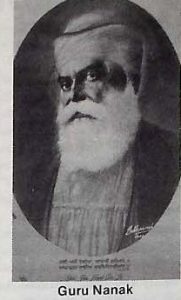
More than five hundred years ago, a great man was born in the land of five rivers. His name was ‘Nanak. He founded the Sikh religion, He was born to Tripta on October 20, 1469 in the village of Talwandi in Sheikhupura District (now is Pakistan and called Nankana Sahib), His father was Kalyan Das Bedi (popularly called Mehta Kalu). He had one older sister Nanaki, From childhood Nanak was different from other boys of his age, He was good in studies and always asked his teacher strange (strange for his age) questions about God, religion etc. His father saw that he was not interested in studies, so he sent him to graze.
‘One day while grazing the cattle, he got busy with his thoughts, and the cattle destroyed some other farmer’s crop. Then his father gave him some money and sent him to nearby town so that he could buy something later or sell it at a profit. But Nanak spent that money on feeding some hungry saints. When he came home his father got angry and slapped him, His sister was the only one in the family who understood Nanak. His father sent him to Sultanpur, where his sister was living. Her husband, Jai Ram got a job for Nanak as a storekeeper.
For a while Nanak worked like an ordinary man, He got married to Sulakhani. They had two sons, Sri Chand and Lakshmi Das. Nanak was well liked by the Nawab (Chief) of Sultanpur. He was accused of mis appropriating the groceries but was found innocent, One early morning he went to take a bath in the nearby river when he saw a vision. He was not seen for three days. People thought he had drowned or committed suicide, but his sister did not give up.
Finally he came back to town and declared, “There is no Hindu and no Muslim”,
After this Nanak gave up regular work, leaving his children under the care of his sister. He went on long journeys. He traveled to Ceylon in South, to Assam in East, to Mecca and Bagdad in West and went to all well-known places of all religions known at the time. He held discussions with religion preachers of that time and pointed the fallacies that they were practicing. He did not believe in any rituals. In Hardwar, he saw Hindus throwing water to the East to rising sun but he started throwing water towards West. When he asked them “What are you doing?”, they replied “We are offering the water to the souls of our forefathers in the next world”, Nanak said, “I am watering my fields at Kartarpurin Punjab”. They all laughed and said, “How will your water reach Punjab?”. He replied, “If your water can reach the next world, surely mine could reach Kartarpur which is in the same world”.
While in Mecca, he slept by putting his feet in the direction of Kabbah. The Priest got angry and said, “How do you dare to dis honour the house of God”. He replied, politely, “I am too tired: you can turn my feet to the direction where there is no God”.
‘When Babar invaded India, he spoke boldly against his cruelty. He had excellent ways of communicating his point of view. He believed and practiced the concept of one God. He said God is every, where, he is not confined to a Temple or a Mosque. He spoke against the Caste System. He be levied that all men are created equal. He believed in basic human rights of every man. He practiced to the Kings to rule in the name of God. He preached to Muslims to be true Muslims and toa Hindu to be a true Hindu. He believed in universal brotherhood, He said that one can live worldly life and still pray to God. One does not have to go to caves or mountains to pray. Which was the custom at the time, He said one should work honestly and should share his earnings with others. His two companions Bala and Mardana accompanied him most of the time. Finally, he started farming. By now, he had many followers. His followers are called “Sikhs” dicigot settled in Kartarpur on the bank of river Ravi and farming, By now, he had many followers, His followers are called “Sikhs” (disciples). At Kartarpur, his most of the writings were collected later. He composed 974 Shabads in 19 Ragas. His main compositions are Japji Sahib, Sohla, Sidh Gosht Dakhani Onkar, Asa Di War, Patt, Baramaha, He died at Kartarpur in 1539 and appointed one of his followers Bhai Lahna as his successor.
Article extracted from this publication >> March 21, 1986